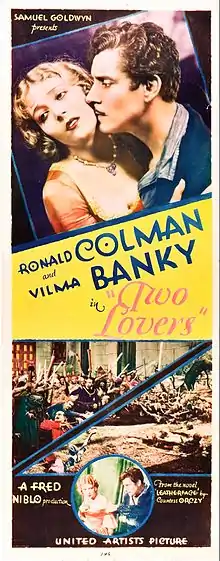| Two Lovers | |
|---|---|
 Film poster | |
| Directed by | Fred Niblo |
| Written by | Alice D. G. Miller (adaptation) John Colton (intertitles) |
| Based on | Leatherface: A Tale of Old Flanders by Baroness Emma Orczy |
| Produced by | Samuel Goldwyn |
| Starring | Vilma Bánky Ronald Colman |
| Cinematography | George Barnes |
| Music by | Hugo Riesenfeld |
Production company | |
| Distributed by | United Artists |
Release dates |
|
Running time | 98 minutes |
| Country | United States |
| Languages | Sound (Synchronized) (English Intertitles) |
Two Lovers is a 1928 American synchronized sound historical drama film directed by Fred Niblo. While the film has no audible dialog, it was released with a synchronized musical score with sound effects using both the sound-on-disc and sound-on-film process. The film stars Vilma Bánky, Ronald Colman, and Noah Beery. Based on the novel Leatherface: A Tale of Old Flanders by Baroness Emma Orczy, it was produced by Samuel Goldwyn.[1]
Plot
Cast
- Ronald Colman as Mark Van Rycke
- Vilma Bánky as Donna Leonora de Vargas
- Noah Beery as The Duke of Azar
- Nigel De Brulier as The Prince of Orange
- Eugenie Besserer as Madame Van Rycke
- Virginia Bradford as Grete
- Helen Jerome Eddy as Inez
- Paul Lukas as Don Ramon de Linea
- Fred Esmelton as Meinherr Van Rycke, the Bailiff of Ghent
- Harry Allen as Jean
- Marcella Daly as Marda
- Scotty Mattraw as Dandermonde Innkeeper
- Lydia Yeamans Titus as Innkeeper's Wife
- Lon Poff (uncredited)
- Jerome Bonaparte "Blackjack" Ward (uncredited)
Music
The film featured a theme song entitled "Lenora" with music by Hugo Riesenfeld and lyrics by L. Wolfe Gilbert. A second theme entitled “Grieving,” which was composed by Wayland Axtell, was also featured on the soundtrack.
Production
The working title of the film was Leatherface, an alias used by Colman's character and the title of the novel the film was based upon. The film premiered as a silent film in New York City in March 1928. By the time that the film was ready for general release in August of 1928, the film had already been equipped with a synchronized musical soundtrack.[1]
Preservation
An incomplete 35mm print with three reels missing survives in the Museum of Modern Art film archive, along with a 16mm viewing copy.[1][2]
See also
References
- 1 2 3 Progressive Silent Film List: Two Lovers at silentera.
- ↑ "7,200 Lost U.S. Silent Feature Films (1912-29) National Film Preservation Board (January 2021) - (Current as of 02.04.2021)" (PDF). LOC.GOV. February 4, 2021.
Some recent "finds" now removed from this list:...
External links
- Two Lovers at IMDb
- Synopsis at AllMovie
- Stills at silenthollywood.com
- Sheet music cover and still at silentfilmstillarchive.com